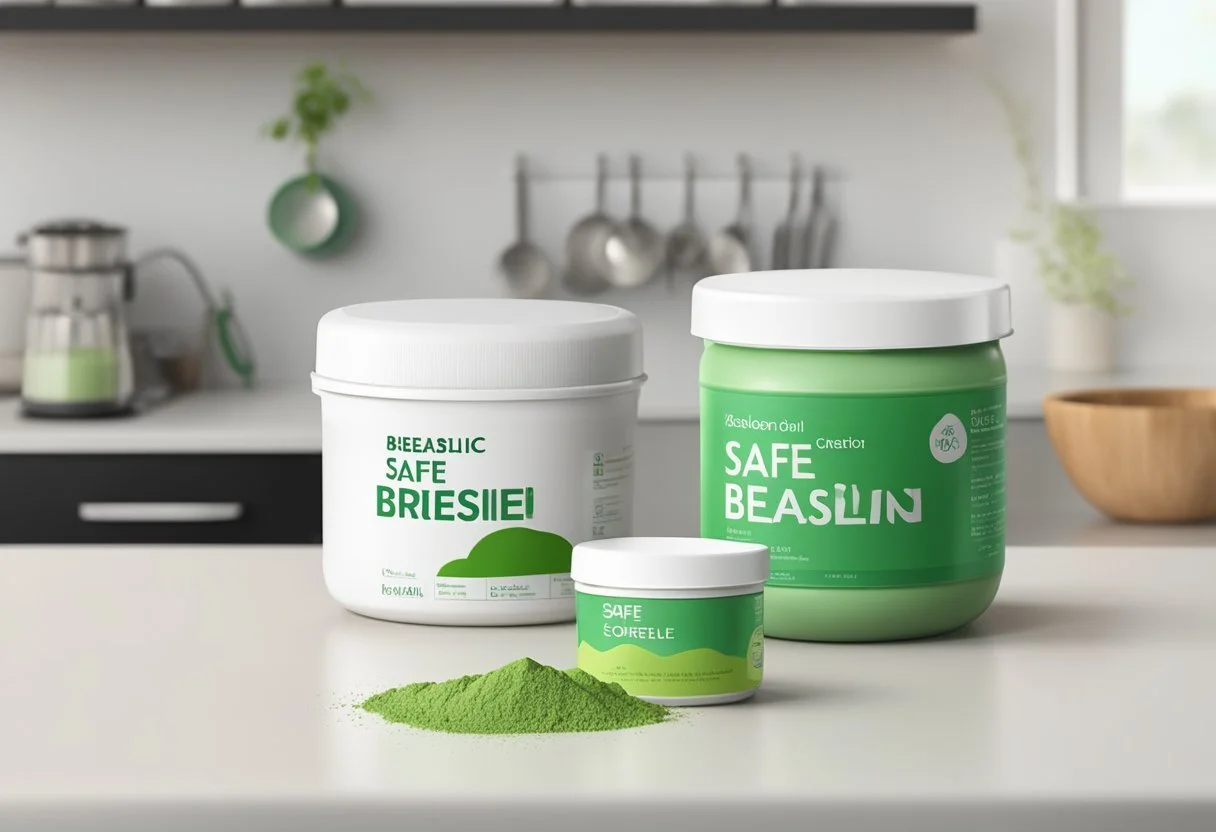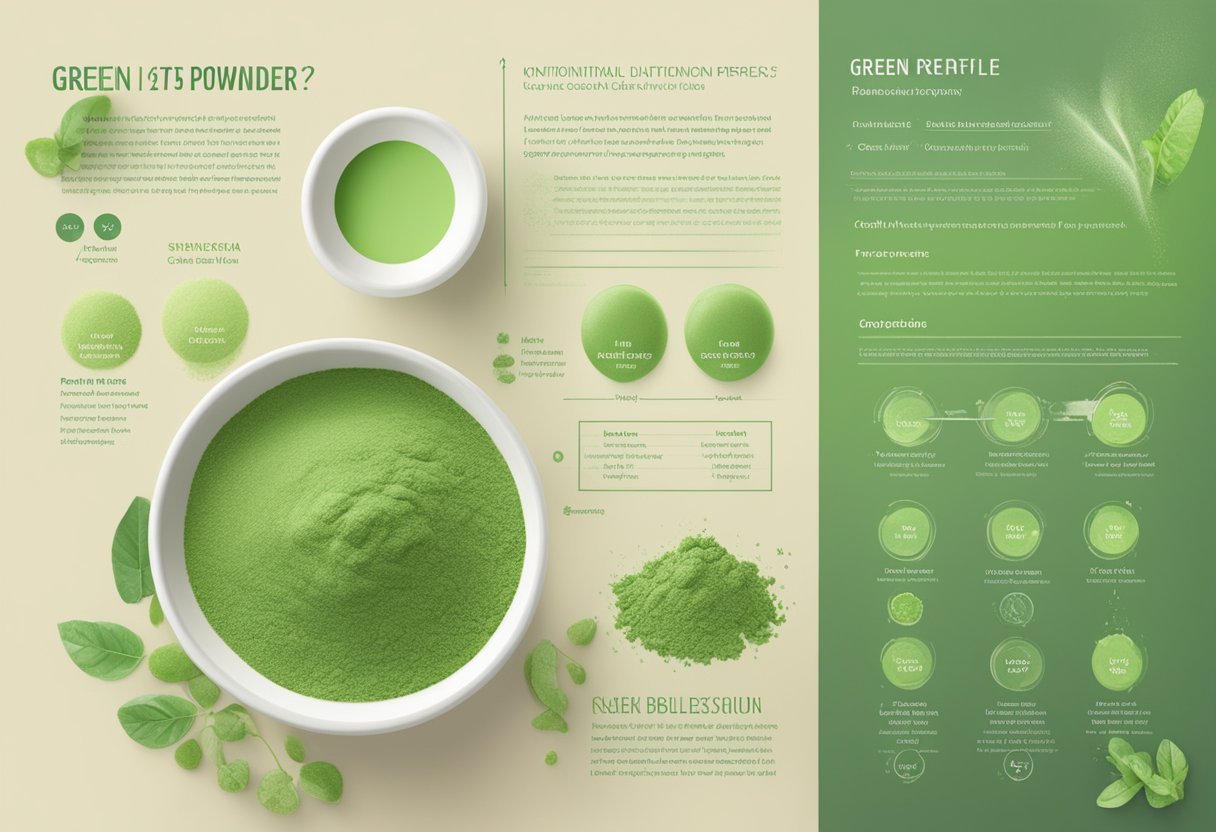Is Green Powder Safe for Breastfeeding?
A Comprehensive Analysis
This article is part of our series on Natural Health
Discover > Natural Health > Is Green Powder Safe for Breastfeeding?
Breastfeeding mothers are often cautious about the foods and supplements they consume, as the nutrients can directly affect the quality of their breast milk. Green powder supplements have become increasingly popular for their potential health benefits, ranging from boosting energy levels to supporting the immune system. As more people turn towards these products, a common concern emerges: Is green powder safe for breastfeeding?
To address this, it is essential to examine the ingredients found in green powder supplements and evaluate the potential impact on lactation and infant health. Many green powders consist of a blend of various fruits, vegetables, herbs, and additional nutrients, making it crucial to consider individual components. Factors such as quality, sourcing, and potential allergens or contaminants may also play a role in determining safety for breastfeeding mothers.
One key aspect to consider is the dietary recommendations for nursing mothers, as their nutritional needs change to support both their own health and their baby's growth. By evaluating these factors and consulting with their healthcare provider, breastfeeding mothers can make informed decisions about the safety and benefits of incorporating green powder supplements into their diet.
Understanding Green Powder
Green powders are a popular dietary supplement made from a blend of various natural and organic ingredients. They typically include leafy greens, grasses, probiotics, digestive enzymes, and adaptogens, aiming to provide an abundance of nutrients in a convenient form. This type of superfood has gained popularity among health-conscious consumers, especially those following a vegan or gluten-free diet.
The primary goal of greens powders is to provide an easy and convenient way to incorporate more leafy greens and essential nutrients into one's daily diet. These powders often contain a mix of ingredients such as kale, spinach, wheatgrass, barley (how long does barley last?) grass, and spirulina – all rich in vitamins, minerals, and antioxidants. Additionally, some green powders also include probiotics and digestive enzymes to aid in digestion and promote a healthy gut.
The safety of green powders for breastfeeding mothers is vital to consider. Generally, consuming natural and organic ingredients in moderation is safe during breastfeeding. However, each green powder product varies in its composition, and it is essential to examine the particular ingredients and their possible effects on both the mother and baby.
While most greens powders include beneficial nutrients, some may contain ingredients that breastfeeding mothers should avoid or consume cautiously. For instance, certain greens powders with high levels of adaptogens, such as ginseng or ashwagandha, can have effects on the hormonal balance and should be used carefully after consulting with a healthcare professional.
It is worth noting that while green powders can boost one's nutritional intake, they should never replace whole foods and a balanced diet. Consuming a variety of fruits, vegetables, grains, and proteins is vital for the health and well-being of both the mother and her baby during the breastfeeding period.
In conclusion, greens powders can potentially provide valuable nutrients to breastfeeding mothers. However, it is crucial to examine each product's ingredients and consult with a healthcare professional before incorporating green powders into a breastfeeding diet.
Nutritional Profile of Green Powder
Green powder is a popular supplement that usually contains a blend of various nutritious ingredients, such as barley grass, wheatgrass, and kale. Its rich nutritional profile consists of essential nutrients, vitamins, and minerals that can provide numerous health benefits.
One of the main advantages of green powder is its high concentration of vitamins and minerals. These include vitamin C, vitamin D, vitamin A, vitamin K, and potassium. The micronutrients found in green powder help support the overall health and well-being of individuals consuming it.
In addition to vitamins and minerals, green powder also contains antioxidants like carotenoids and flavonoids. Antioxidants play a crucial role in protecting the body against cellular damage due to free radicals, reducing inflammation, and potentially lowering the risk of chronic conditions.
Protein and fiber are other vital components of green powder. The protein content typically comes from plant sources, such as the barley grass and wheatgrass, while the fiber comes from sources like kale and other vegetables. Fiber is crucial for maintaining a healthy digestive system and regulating blood sugar levels.
Iron, calcium, and folate are also present in green powder. Iron contributes to the formation of hemoglobin and myoglobin while supporting brain health and optimal functioning of the immune system. Calcium is essential for healthy bones and teeth, and folate plays a significant role in cell growth, metabolism, and the formation of red and white blood cells.
To summarize, green powder is loaded with essential nutrients, vitamins, minerals, and antioxidants. Its rich nutritional profile includes constituents like protein, fiber, iron, calcium, and micronutrients derived from sources such as barley grass, wheatgrass, and kale. As a result, incorporating green powder into one's diet can ensure a well-rounded intake of nutrients to support overall health and well-being.
Health Benefits of Green Powder
Green powder is a popular supplement among health enthusiasts seeking to improve overall health, energy levels, and nutrition. This versatile product is often considered safe for breastfeeding mothers, offering an array of benefits for both the mother and the baby.
One of the primary benefits of green powder is the improvement of energy levels. Breastfeeding requires a significant amount of energy, and maintaining proper nutrition during this period is essential. Green powder contains a variety of nutrients, including vitamins and minerals, which are vital for maintaining energy levels and preventing fatigue.
Gut health is another area positively impacted by green powder consumption. The supplement contains a blend of probiotics and digestive enzymes that promote healthy digestion. By improving gut health, breastfeeding mothers can enhance nutrient absorption and pass on the benefits to their babies.
In addition to energy and gut health, green powder also supports a healthy immune system. Breastfeeding mothers often experience a reduced immune system due to the energy demands of nursing. Green powder is rich in antioxidants and phytonutrients that help fortify the immune system, keeping both mother and baby healthier.
Lastly, the detoxification benefits of green powder should not be overlooked. The supplement contains natural ingredients, such as chlorella and spirulina, which are known for their detoxifying properties. This can be particularly beneficial for breastfeeding mothers, as it improves overall health and assists in the removal of toxins from the body.
In conclusion, incorporating green powder into the diet of breastfeeding mothers can be highly beneficial, providing a range of essential nutrients and health advantages. By optimizing energy levels, gut health, immune support, and detoxification, mothers can better care for themselves and their babies throughout the breastfeeding journey. Remember, however, to always consult with a healthcare professional before making significant changes to the diet, especially during breastfeeding.
Safety and Concerns of Green Powder
When considering the safety of green powder for breastfeeding mothers, it's essential to examine the research and available data. While many green powders on the market claim to be safe and beneficial, it's critical to approach these products with caution and ensure they are properly tested and regulated.
One concern regarding green powder products is the potential presence of contaminants such as lead and other heavy metals. These contaminants can occur naturally in soil and can be absorbed by plants used in green powder formulations. Heavy metals in high concentrations can cause harm to both mother and baby and must be monitored.
To ensure the safety and quality of green powder supplements, it's recommended to check for third-party testing from organizations such as the NSF (National Sanitation Foundation). Such testing certifies that the product meets strict standards for safety and that it contains the ingredients it claims. While FDA (Food and Drug Administration) does not specifically regulate green powders, the agency monitors and inspects dietary supplements with the same safety guidelines applied to food.
When selecting a green powder, breastfeeding mothers should opt for products that are transparent about their ingredients and manufacturing processes. Look for supplements that utilize organic and non-GMO ingredients, as these are less likely to contain harmful chemicals, pesticides, and contaminants.
In conclusion, while green powders may offer health benefits to breastfeeding mothers, it is vital to exercise caution when selecting a supplement. Ensure the product has undergone third-party testing and meets safety standards. It's always a good idea to consult a healthcare professional before incorporating new dietary supplements, especially during breastfeeding.
Green Powder and Breastfeeding
Green powder supplements have gained popularity in recent years due to their potential health benefits and convenience. However, when it comes to breastfeeding, nursing mothers may wonder if these supplements are safe for both themselves and their babies.
Breastfeeding is a critical period for the growth and development of infants. The mother's milk is the primary source of nutrients, and it is crucial for nursing mothers to consume a well-balanced diet to ensure an adequate supply of essential nutrients. While green powder supplements claim to provide a range of vitamins, minerals, and antioxidants, it is essential to consider their safety during pregnancy and lactation.
Some green powder supplements contain ingredients that may not be suitable for breastfeeding mothers. For instance, certain herbs, such as ginseng, may negatively impact milk production or transfer potentially harmful substances to the baby. Therefore, it is vital for nursing mothers to carefully review the ingredients of any green powder supplement and consult with a healthcare professional before incorporating it into their diet.
Another concern with green powder supplements is the potential for contaminants. Due to their plant-based composition, these products are at risk for contamination with heavy metals or pesticides. Consuming contaminated supplements could pose risks to both the nursing mother and her baby, particularly during the sensitive breastfeeding period.
One solution to address the safety concerns of green powder supplements could be to opt for whole foods as natural sources of vitamins and minerals. Consuming a diverse range of fruits, vegetables, and other nutrient-dense foods can provide nursing mothers with the necessary nutrients to support their own health and the growth and development of their babies.
In conclusion, while green powder supplements may offer a convenient way to increase nutrient intake, their safety for breastfeeding mothers remains questionable. Prioritizing a balanced diet with whole foods and consulting with a healthcare professional can help develop a healthy and safe meal plan during the nursing period.
The Role of Diet in Breastfeeding
Breastfeeding mothers need to pay attention to their diet, as it plays a crucial role in supplying essential nutrients to their newborn. A well-balanced diet, rich in a variety of foods, ensures the mother's health and provides the baby with sufficient nutrition for growth and development.
Fruits and vegetables should be included in the daily diet, as they provide essential vitamins, minerals, and antioxidants. It is necessary for nursing mothers to consume ample amounts of leafy greens, colorful fruits, and other nutrient-dense vegetables. Additionally, adequate hydration is vital for maintaining milk production; therefore, a regular intake of water and other fluids is essential.
A proper balance of proteins, carbohydrates, and fats also holds significance in a breastfeeding mother's diet. Proteins, derived from sources like lean meats, fish, dairy products, and legumes, aid in producing high-quality breast milk. Whole grains and complex carbohydrates, such as brown rice, quinoa (how long does quinoa last?), and whole wheat, provide energy and promote healthy digestion. Healthy fats like omega-3 fatty acids, found in salmon, walnuts (how long do walnuts last?), and chia seeds (how long do chia seeds last?), contribute to the baby's brain development.
To sum up, a nutritious and balanced diet plays a critical role in breastfeeding by ensuring the mother's well-being and providing the baby with the nutrients needed for growth. Mothers should focus on incorporating a variety of fruits, vegetables, lean proteins, whole grains, and healthy fats into their daily diets, along with maintaining adequate hydration.
Choosing the Right Green Powder
When selecting a green powder for breastfeeding, it is crucial to consider factors such as quality, brand, taste, variety, and value. Doing so ensures the product offers the necessary nutrients and is safe for both the mother and the baby.
Quality should be the top priority, as this determines the effectiveness and safety of the green powder. Look for products that have been tested for purity and potency, and ensure they are made from organic, non-GMO ingredients. Additionally, selecting a powder that is free of fillers, artificial colors, and sweeteners is highly recommended.
Considering various brands can help you find the best green powder for your needs. Research the reputation and customer reviews of each brand to make an informed decision. Some reputable brands in the green powder market include Amazing Grass, Garden of Life, and Sunwarrior.
The taste of a green powder significantly affects your likeliness to consume it regularly. Green powders come in a variety of flavors and textures to suit different preferences. While some are unflavored and can be mixed with other beverages, others have added natural flavors, such as berry, chocolate, or vanilla. Trying out a few options will help you find the taste that best suits your palette.
When it comes to value, it is important to weigh the cost and the benefits of each green powder. While some products might be more expensive than others, they may offer a higher concentration of nutrients and better quality ingredients. Compare the per-serving price of different green powders and the nutrients they provide to make an informed decision.
In conclusion, finding the right green powder for breastfeeding requires careful consideration of factors such as quality, brand, taste, variety, and value. Ensuring the chosen product meets these criteria will help support the nutritional needs of both the mother and the baby.
Potential Side Effects
Green powder supplements are generally considered safe for breastfeeding mothers. However, just like with any dietary supplement, there can be potential side effects. This section will discuss some of the common side effects that breastfeeding mothers might experience while taking green powder.
The first potential side effect is nausea. Some mothers might find the taste or smell of the green powder to be unpleasant, leading to feelings of nausea. It is important to note that this is a personal reaction and does not necessarily indicate any negative impact on the baby.
Another potential side effect is an allergic reaction. Some green powder supplements contain a variety of ingredients, including different types of plants, fruits, and vegetables. Therefore, individuals who are allergic to a specific ingredient might experience an allergic reaction upon consumption. Symptoms could include skin rashes, swelling, or difficulty breathing. If you suspect an allergic reaction, it is best to consult your healthcare provider and stop taking the supplement immediately.
Furthermore, some green powder supplements may contain high levels of vitamins and minerals. For breastfeeding mothers, excessive intake of certain micronutrients, like vitamin A, can lead to potential side effects for the baby. It is essential to be aware of the recommended daily allowances for each nutrient to avoid any complications.
Lastly, the quality and purity of the green powder can play a significant role in determining its safety. Low-quality supplements may contain harmful contaminants, such as heavy metals or pesticides, posing risks for both the mother and the baby. Choosing a reputable brand and ensuring the product undergoes third-party testing will help minimize these risks.
In conclusion, while green powder supplements can provide nutritional benefits, it is crucial for breastfeeding mothers to be aware of the potential side effects. Consulting with a healthcare professional before taking any dietary supplement is highly recommended.
Consulting Your Doctor
When considering the use of green powder supplements while breastfeeding, it is essential to consult with a healthcare professional. They possess the knowledge and expertise to evaluate the safety and potential benefits of these supplements for both mother and child. In some cases, taking green powder supplements may be deemed appropriate, while in others, it may not be recommended.
Doctors can provide valuable guidance on the appropriate use of green powder, taking into account the mother's current medications and overall health. Interactions with other medications can occur, potentially leading to undesirable side effects for both the breastfeeding mother and the infant. It is crucial to assess all aspects of one's health and medical history before incorporating any new supplement.
By seeking the advice of a healthcare professional, mothers can confidently make informed decisions regarding the consumption of green powder supplements during breastfeeding. Doing so ensures the safety and well-being of both mother and baby, as well as encourages optimal nutrition and development for the child.
The Natural Approach to Dry Skin and Scalp
Dry skin and scalp can be uncomfortable and frustrating, but there are natural remedies that can help. Food supplements like vitamin D, collagen, and omega-3 fatty acids can all promote healthy skin and reduce dryness. Incorporating these supplements into your diet, along with plenty of water and nutrient-rich foods like fruits, vegetables, and whole grains, can help to hydrate and nourish your skin from the inside out.
For those suffering from a dry, itchy scalp, natural remedies like tea tree oil, aloe vera, and apple cider vinegar can provide relief. These ingredients have anti-inflammatory and antimicrobial properties that can soothe the scalp and reduce itching and irritation.
Many people are also curious about what fragrance is made of. Unfortunately, many fragrances are made from synthetic chemicals that can be harmful to our health and the environment. By choosing natural fragrances made from essential oils and plant-based ingredients, individuals can enjoy beautiful scents without the potential risks of synthetic fragrances.
Finally, it's important to be aware of the potential dangers of petroleum-based products. These products, like petroleum jelly and mineral oil, can clog pores and prevent the skin from breathing, leading to dryness and other skin problems. By choosing natural alternatives like coconut oil or shea butter, individuals can promote healthy, hydrated skin without the use of potentially harmful ingredients.
By embracing the natural approach to health and beauty, individuals can promote a healthier lifestyle and reduce their exposure to potentially harmful chemicals.
#greens breastfeeding #greens powder supplement #greens powder supplements #healthy diet #greens powders safe #not all greens powders #organic greens blend







